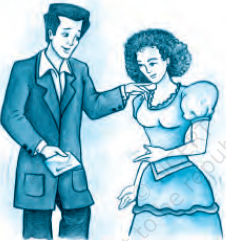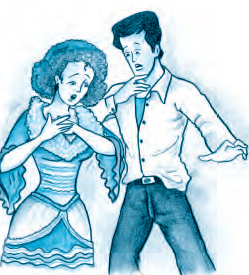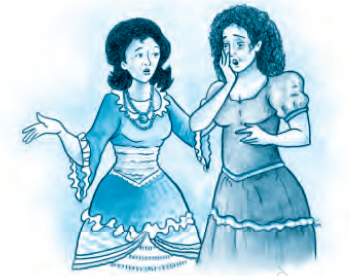Class X- (Footprints without feet book-Chapter 7)-The Necklace By- Guy De Maupassant
The Necklace
By- Guy De Maupassant

Introduction to the lesson
The story revolves around a selfish lady named Matilda. She is unsatisfied with her life as she wants a rich husband but because she belongs to a family of clerks and her family is unable to give dowry she is married to a clerk. One day, both the husband and wife are invited to a party at the minister’s house. But Matilda does not have good clothes and jewels to wear at such a party. Her husband suggests her to buy a dress and ask an old friend for jewellery. She then borrows a necklace from her friend and goes to the party. What happens next proves to be a lesson for the unhappy lady.
About the Characters
·
Matilda Loisel She is a pretty young woman who
is married to a i clerk. She is dissatisfied with what she has. She is always
lost in her dreams of wealth and pleasure.
·
M Loisel He is the husband of Matilda
and is an ordinary clerk. He lives within his means. He always tries to please
his wife as he is a caring man.
·
Madam Forestier She is a good friend of Matilda. She is
helpful and considerate. She lends Matilda a necklace that leads to her ruin.

About the Author
Henri René Albert Guy de Maupassant (5 August 1850 – 6 July 1893) was a French writer, remembered as a master of the short story form, and as a representative of the naturalist school of writers, who depicted human lives and destinies and social forces in disillusioned and often pessimistic terms. He wrote some 300 short stories, six novels, three travel books, and one volume of verse.

The Necklace -Summary
Mme. Matilda Loisel lived in an apartment with her husband M. Loisel and was very unhappy and unsatisfied with what life had given her. She was unhappy with the apartment’s shabby walls and the worn out furniture. She was also irritated by the way her husband reacted to the home made food while she dreamt of royal dinners being served in exquisite silver dishes. They were neither rich nor poor. She had to marry a clerk in the office of the board of education just because her family couldn't afford to give her dowry. She also hated visiting her old friend Mme. Jeanne Forestier as she was a rich lady and Matilda envied her. Whenever she visited her, she became sad and cried for days together. One day when her husband returned home from work, he got an invitation to a party at the house of minister of public instruction. Contrary to his expectation, Matilda was irritated and angry and threw the card away. She was upset because she didn't have anything to wear at such an extravagant party. Her husband gave her 400 francs to buy a new dress, that he had been saving to buy a gun so that he could go hunting with his friends. After buying the dress she was sad because she did not have jewellery to make herself look more appealing and attractive. Her husband suggested that she could borrow jewellery from her friend Mme. Forestier. When Mme. Loisel went to her friend’s house and described the situation, she showed her the cupboard and asked her to choose whatever she liked. Matilda chose a precious diamond necklace which was kept in a black satin box.

The Necklace -Text (with word meanings)
SHE was one of those pretty, young ladies, born as if through an error of destiny, into a family of clerks. She had no dowry, no hopes, no means of becoming known, loved, and married by a man either rich or distinguished; and she allowed herself to marry a petty clerk in the office of the Board of Education. She was simple, but she was unhappy. She suffered incessantly, feeling herself born for all delicacies and luxuries. She suffered from the poverty of her apartment, the shabby walls and the worn chairs. All these things tortured and angered her. When she seated herself for dinner opposite her husband who uncovered the tureen with a delighted air, saying,


She quickly drew out a printed card on which were inscribed these words:
Instead of being delighted, as her husband had hoped, she threw the invitation spitefully upon the table murmuring, “What do you suppose I want with that?”
“But, my dearie, I thought it would make you happy. You never go out, and this is an occasion, and a fine one! Everybody wishes one, and it is very select; not many are given to employees. You will see the whole official world there.”
She looked at him with an irritated eye and declared impatiently, “What do you suppose I have to wear to such a thing as that?”
He had not thought of that; he stammered, “Why, the dress you wear when we go to the theatre. It seems very pretty to me…” He was silent, stupefied, in dismay, at the sight of his wife weeping. He stammered, “What is the matter?
What is the matter?” By a violent effort, she had controlled her vexation and responded in a calm voice, wiping her moist cheeks, “Nothing. Only I have no dress and consequently I cannot go to this affair. Give your card to some colleague whose wife is better fitted out than I.”
He was grieved, but answered, “Let us see, Matilda. How much would a suitable costume cost, something that would serve for other occasions,


He turned a little pale, for he had saved just this sum to buy a gun that he might be able to join some hunting parties the next summer, with some friends who went to shoot larks on Sunday. Nevertheless, he answered, “Very well. I will give you four hundred francs. But try to have a pretty dress.”
The day of the ball approached and Mme Loisel seemed sad, disturbed, anxious. Nevertheless, her dress was nearly ready. Her husband said to her one evening, “What is the matter with you? You have acted strangely for two or three days.”
And she responded, “I am vexed not to have a jewel, nothing to adorn myself with. I shall have such a poverty-stricken look. I would prefer not to go to this party.” He replied, “You can wear some natural flowers. In this season they look very chic.”
She was not convinced. “No”, she replied, “there is nothing more humiliating than to have a shabby air in the midst of rich women.”
Then her husband cried out, “How stupid we are! Go and find your friend Mme Forestier and ask her to lend you her jewels.”
She uttered a cry of joy. “It is true!” she said. “I had not thought of that.” The next day she took herself to her friend’s house and related her story of distress. Mme Forestier went to her closet, took out a large jewel-case, brought it, opened it, and said, “Choose, my dear.”
She saw at first some bracelets, then a collar of pearls, then a Venetian cross of gold and jewels of admirable workmanship. She tried the jewels before the glass, hesitated, but could neither decide to take them nor leave them. Then she asked, “Have you nothing more?”
“Why, yes. Look for yourself. I do not know what will please you.” Suddenly she discovered, in a black satin box, a superb necklace of diamonds. Her hands trembled as she took it out. She placed it about her throat against her dress, and was ecstatic. Then she asked, in a hesitating voice, full of anxiety, “Could you lend me this? Only this?” “Why, yes, certainly.”
She fell upon the neck of her friend, embraced her with passion, then went away with her treasure.
The day of the ball arrived. Mme Loisel was a great success. She was the prettiest of all — elegant, gracious, smiling and full of joy. All the men noticed her, asked her name, and wanted to be presented.
She danced with enthusiasm, intoxicated with pleasure, thinking of nothing but all this admiration, this victory so complete and sweet to her heart.
She went home towards four o’clock in the morning. Her husband had been half asleep in one of the little salons since midnight, with three other gentlemen whose wives were enjoying themselves very much.
He threw around her shoulders the modest wraps they had carried whose poverty clashed with the elegance of the ball costume. She wished to hurry away in order not to be noticed by the other women who were wrapping themselves in rich furs.
Loisel detained her, “Wait,” said he. “I am going to call a cab.” But she would not listen and descended the steps rapidly. When they were in the street, they found no carriage; and they began to seek for one, hailing the coachmen whom they saw at a distance. They walked along toward the river, hopeless and shivering. Finally they found one of those old carriages that one sees in Paris after nightfall. It took them as


Yes, I felt it as we came out.”
“But if you had lost it in the street, we should have heard it fall. It must be in the cab.” “Yes, it is possible. Did you take the number?” “No. And you, did you notice what it was?” “No.”
They looked at each other utterly cast down. Finally Loisel dressed himself again. “I am going,” he said, “over the track where we went on foot, to see if I can find it.” And he went. She remained in her evening gown, not having the force to go to bed.
Toward seven o’clock her husband returned. He had found nothing. He went to the police and to the cab offices, and put an advertisement in the newspapers, offering a reward.
She waited all day in a state of bewilderment before this frightful disaster. Loisel returned in the evening, his face pale; he had discovered nothing.
He said, “Write to your friend that you have broken the clasp of the necklace and that you will have it repaired. That will give us time.”

She wrote as he dictated. At the end of a week, they had lost all hope. And Loisel, older by five years, declared, “We must replace this jewel.”
In a shop of the Palais-Royal, they found a chaplet of diamonds, which seemed to them exactly like the one they had lost. It was valued at forty thousand francs. They could get it for thirty-six thousand.
Loisel possessed eighteen thousand francs, which his father had left him. He borrowed the rest. He made ruinous promises, took money from usurers and the whole race of lenders. Then he went to get the new necklace, depositing on the merchant’s counter thirty-six thousand francs.
When Mme Loisel took back the jewels to Mme Forestier, the latter said to her in a frigid tone, “You should have returned them to me sooner, for I might have needed them.”
Cast down- sad or worried
Mme Forestier did not open the jewel-box as Mme Loisel feared she would. What would she think if she should perceive the substitution? What should she say? Would she take her for a robber?
Mme Loisel now knew the horrible life of necessity. She did her part, however, completely, heroically. It was necessary to pay this frightful debt. She would pay it. They sent away the maid, they changed their lodgings; they rented some rooms in an attic. She learned the odious work of a kitchen. She washed the dishes. She washed the soiled linen, their clothes and dishcloths, which she hung on the line to dry; she took down the refuse to the street each morning and brought up the water, stopping at each landing to catch her breath. And, clothed like a woman of the people, she went to the grocer’s, the butcher’s and the fruiterer’s, with her basket on her arm, shopping, haggling to the last sou of her miserable money.

The husband worked evenings, putting the books of some merchants in order, and nights he often did copying at five sous a page. And this life lasted for ten years. At the end of ten years, they had restored all. Mme Loisel seemed old now. She had become a strong, hard woman, the crude woman of the poor household. Her hair badly dressed, her skirts awry, her hands red, she spoke in a loud tone, and washed the floors with large pails of water. But sometimes, when her husband was at the office, she would seat herself before the window and think of that evening party of former times, of that ball where she was so beautiful and so flattered.
How would it have been if she had not lost the necklace? Who knows? How singular is life, and how full of changes! How small a thing will ruin or save one! One Sunday as she was taking a walk in the Champs-Elysees to rid herself of the cares

“Yes, I have had some hard days since I saw you; and some miserable ones — and all because of you ...”
“Because of me? How is that?”
“You recall the diamond necklace that you loaned me to wear to the Minister’s ball?” “Yes, very well.” “Well, I lost it.”
“How is that, since you returned it to me?” “I returned another to you exactly like it. And it has taken us ten years to pay for it.
You can understand that it was not easy for us who have nothing. But it is finished and I am decently content.”
Mme Forestier stopped short. She said, “You say that you bought a diamond necklace to replace mine?”
“Yes. You did not perceive it then? They were just alike.” And she smiled with proud and simple joy. Mme Forestier was touched and took both her hands as she replied, “Oh! My poor Matilda! Mine were false. They were not worth over five hundred francs!”
Text Book - Question Answers
Q1) What kind of a person is Mme Loisel — why is she always unhappy?
Ans) Mme Loisel is a very unhappy and unsatisfied person. She is not happy with her married life, her house or for that matter anything in her life. She always keeps on dreaming about how her life would have been if she were born in a rich house, married in a rich house and had lots of money to buy things. She is a greedy woman and always keeps on thinking of having more and more things.
Q2) What kind of a person is her husband?
Ans) Her husband is a very caring and a loving man. He is not greedy as he stays happy with whatever he has. He appreciates the little things that life has given him and does not want to see his wife unhappy for which he sacrifices his own needs.
Q3) What fresh problem now disturbs Mme Loisel?
Ans) Mme Loisel’s husband agrees to buy her a dress worth 400 francs and sacrifices his own requirement of buying a gun but Mme. Loisel, being a greedy woman starts acting strangely and demands jewellery to wear or else she will not go to the party.
Q4) How is the problem solved?
Ans) When she does not agree to wear flowers to the party, her husband suggests her to approach her friend Mme Forestier who is a rich lady and would lend her jewellery to wear at the party.
Q5) What do M. and Mme Loisel do next?
Ans) M and Mme. Loisel make a lot of efforts after they realize that they have lost the necklace. They try to remember the cab number so that they can check there, M. loisel goes to the tracks where she could have dropped it, reports at the police station and cab offices. He also gives an advertisement in the newspaper saying that the person who returns it will be rewarded but nothing works. So they finally decide to replace the necklace by buying a necklace similar to the one they have lost.
Q6) How do they replace the necklace?
Ans) They buy a necklace from a shop for 36000 francs. They themselves have only 18000 francs so they borrow the rest of the money by making up false stories and taking loans from a lot of lenders.

Comments
Post a Comment